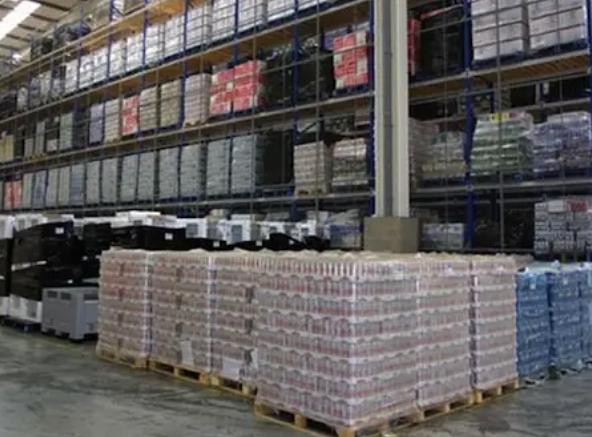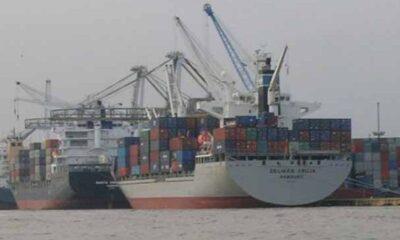Business
Manufacturers In Dire Straits As Unsold Goods Hit N470bn
Published
11 months agoon
By
Editor
The Nigerian manufacturing sector is struggling with rising levels of unsold goods with inventory stockpile up 22 per cent to N469.66 billion in 2022 from N384.58 billion in the preceding year. Also, industry operators are saying the situation is worsening.
A report from the bi-annual economic review of the Manufacturers Association of Nigeria (MAN), the umbrella body of manufacturers in Nigeria, attributed the rise in inventory to a drop in the purchasing power of Nigerians occasioned by sustained inflationary pressures and worsened by the cash crunch that hit the economy in the first quarter of 2023, Q1’23, in the wake of the Naira Redesign policy. Analysis of the report shows that the rise in inventory is despite a 9.7 percent decrease in the manufacturing sector factory output to N6.67 trillion in 2022 from N7.39 trillion in 2021.
Commenting on the development, Director General, MAN, Segun Ajayi-Kadir, stated: “Inventory of unsold goods in the sector totalled N469.66 billion in 2022 as against N384.58 billion recorded in 2021. The high inventory recorded in the period is attributed to low purchasing power in the economy due to the declining real income of households following the continuous increase in inflationary pressures in the country.
“This is worsened by the Naira Redesign policy which began in the last quarter of 2022. The withdrawal of a large amount of the ‘old Naira’ without commensurate replacement with the ‘new notes’ resulted in a cash crunch in the economy with very limited means of purchasing items by households across the country.
READ ALSO: Businesses You Can Start With N50,000 Capital
“Inventory of unsold finished products in the manufacturing sector increased to N282.56 billion in the second half of 2022 up from N169.75 billion recorded in the corresponding half of 2021; thus, indicating N112.81 billion or 66 percent increase over the period. It also increased by N85.46 billion or 51 percent when compared with N187.1 billion recorded in the first half of the year.
“In the second half of 2022 as the cost of wheat and other food inputs increased; prices of fuels, particularly diesel rose by over 50 percent; cost of transportation logistics including shipping escalated even as the effect of COVID-19 pandemic is yet to fully die down. In addition to these challenges was the CBN policy on Redesigning the Naira.
“The CBN policy created a cash crunch that debilitated economic activities in the last quarter of 2022. This particularly affected the manufacturing sector adversely as it was extremely difficult to sell most of the Fast-Moving consumer Goods (FMCG) and other commodities by the sector in the period.” He called on the government to formulate and implement a national policy that would address the current high inflation in the country.
Factories closure imminent
Also speaking on the situation, MAN President, Francis Meshioye said: “The manufacturing sector has been struggling with crashing sales, mainly attributable to the sustained naira scarcity. A continuing decline in sale volumes will necessitate production cuts and a reevaluation of investments in the sector.
READ ALSO: Cashless Policy: Business Makes Easier As Tech Firm In Benin Launches Offline Transaction App
“Specifically, if sales proceeds can no longer sustain business overheads and operating expenses, businesses will be forced to scale down their operations which would result in factory closures, job losses, a decline in exports and much more.”
FMCGs kick on excessive taxation
Meanwhile, operators in the Fast Moving Consumer Goods (FMCG) industry have urged national and sub-national governments in Nigeria to stop making the sub-sector the target of their revenue mobilisation drive; which has led to the slow pace of growth in the sector.
Director, Corporate Affairs & Sustainability, Coca Cola Hellenic Bottling Company, Mr. Ekuma Eze, who made the plea at a recent event, said the FMCG sector has borne the brunt of such revenue mobilisation drives.
According to him, the FMCGs, which form the largest chunk of the manufacturing sector in Nigeria, and the fourth largest sector of the nation’s economy sector, are overburdened with taxes and levies, compared with their counterparts in other countries.
Eze said the introduction of, and increase in taxes, in recent times, bore eloquent testimony that companies in the nation’s FMCG remain the target of the government’s revenue drive.
Company income tax rate in Nigeria is 30 percent for companies with gross turnover greater than N100 million, compared to an Africa average of 23.5% and a worldwide average of 23.4 percent.
READ ALSO: Naira Scarcity May Affect Private Business In Q1 – Report
He stated further: “Tertiary Education Tax is now 3 percent going by the Finance Bill 2022.
“There’s been a consistent increase in excise tax for beer and tobacco companies while N10/1 excise tax was introduced in June 2022.
“The introduction of this new tax regime, due to price elasticity of demand, which is high among lower income consumers, who are major consumers of the products, has led to reduction in sales and a revenue decline of 16 percent between June 1 and December 2022.” He also lamented the negative impact of the recent Naira Redesign Policy on the sector, noting that the policy had succeeded in significantly reducing sales between February and March, this year, by between 20 percent and 60 percent.
According to him, the fallout of this is the re-organisation option being contemplated by some companies; a development, he noted, may further compound the nation’s unemployment issue.
Significant sales drop
“Many FMCGs reported significant sales decreases in February and March by between 20 to 60%. Many of these businesses are planning to restructure, which will worsen the unemployment problem,” Eze added.
READ ALSO: How Lagos Businessman Defrauds Customer Of N2.5m
Recall that MAN had issued a statement on May 2, 2023 condemning the recently released 2023 Fiscal Policy Measures, FPM, by the Federal Ministry of Finance, Budget and National Planning, saying that it would lead to industry recession, capacity under-utilisation, and layoffs of workers.
“We are again emphasising the fact that the proposed increase in the recently released 2023 guidelines i.e., on Beer, Wines and Spirits, Tobacco, has the potential to trigger unprecedented distortions in the affected industries as well as the entire manufacturing sector. “The policy is capable of producing a negative effect on investments with a huge consequence on job retention in these industries,” MAN had stated.
Inflationary pressure
Also commenting, Dr Chinyere Almona, Director General, Lagos Chamber of Commerce and Industry (LCCI), lamented that the rising inflationary pressure has significant and worrisome impacts on both the household and business sectors.
Her words: “Since February 2016 to date, the country has recorded a double-digit monthly inflation rate, with an adverse effect on the size of its middle class.
“Apart from eroding purchasing power, it has led to inventory stockpiles. If left unchecked, the high inflation may further constrain production, lead to a steeper rise in poverty figures, frustrate economic growth, and lead to higher unemployment and non-competitive exports, especially in the sub-region. LCCI is concerned that despite consistent monetary policy rate hikes, taming the inflation trend has remained futile.
“We, however, appeal to the government to implement fiscal measures, such as reducing/ removing taxes on staple food items to protect the most vulnerable as well as spur demand-side growth.”
VANGUARD
You may like


Snake Island To Attract $1bn Private Investment – Official


Foreign Portfolio Investments Drop 49% In 2 Months Of 2023


White Dove’s Pioneering Efforts in Alternative Crude Evacuation, A Differentiating Factor – CEO


2023: Ovia Youths Begins Mobilisation For Igbinedion


Congress rolls out ‘Better Deal,’ new economic agenda


MSNBC finishes first in primetime basic cable for first time ever

The Central Bank of Nigeria (CBN) started fresh and direct sales of US dollars at N1,021 per dollar to Bureau De Change operators.
Nigeria’s apex bank disclosed this in a circular signed by its Director of Trade and Exchange Department Hassan Mahmud.
“We write to inform you of the sale of $10,000 by the Central Bank of Nigeria (CBN) to BDCs at the rate of N1,021/$1. The BDCs are in turn to sell to eligible end users at a spread of NOT MORE THAN 1.5 percent above the purchase price,” the circular posted on its website read.
READ ALSO: Tinubu Unveils African Counter-Terrorism Summit
“ALL eligible BDCs are therefore directed to commence payment of the Naira deposit to the underlisted CBN Naira Deposit Account Numbers from today, Monday, April 22, 2024, and submit confirmation of payment, with other necessary documentations, for disbursement of FX at the respective CBN Branches.”
CBN’s move is coming as the naira is recording a slight depreciation against the dollar after weeks of gains.
In late March, the bank also sold $10,000 to each of the eligible Bureau De Change (BDC) operators in the country at the rate of N1,251/$1.
READ ALSO: Mixed Reactions Trail Video Of Couple’s Customised N200 Notes
Like in the most recent sales, it warned BDCs against breaching terms of the dollar sales, vowing to sanction defaulters “including outright suspension from further participation in the sale”.
The fortunes of the naira have fallen sharply since President Bola Tinubu took over in May. Inflation figures have reached new highs and the cost of living hitting the rooftops.
Nigeria’s currency slid to about N1,900/$ some months ago at the parallel market. But in recent weeks, it has gained against the dollar.
The Nigerian authorities have also doubled down on their crackdown against cryptocurrency platform Binance and illegal BDCs.
On March 1, the CBN revoked the licences of 4,173 BDCs over compliance failures.

Olusegun Alebiosu has been appointed as the Acting Managing Director/Chief Executive Officer of First Bank of Nigeria Limited (FirstBank Group), effective April 2024.
Alebiosu steps into this pivotal role from his previous position as the Executive Director, Chief Risk Officer, and Executive Compliance Officer, a position he held since January 2022.
Alebiosu brings to the helm of FirstBank over 28 years of extensive experience in the banking and financial services industry. His expertise spans various domains including credit risk management, financial planning and control, corporate and commercial banking, agriculture financing, oil and gas, transportation, and project financing.
READ ALSO: JUST IN: Access Holdings Names New Acting CEO
Having embarked on his professional journey in 1991 with Oceanic Bank Plc. (now EcoBank Plc.), Alebiosu has held several notable positions in esteemed financial institutions.
Prior to joining FirstBank in 2016, he served as Chief Risk Officer at Coronation Merchant Bank Limited, Chief Credit Risk Officer at the African Development Bank Group, and Group Head of Credit Policy & Deputy Chief Credit Risk Officer at United Bank for Africa Plc.
Alebiosu’s academic credentials further enrich his professional profile. He is an alumnus of the Harvard School of Government and holds a Bachelor’s degree in Industrial Relations and Personnel Management. Additionally, he obtained a Master’s degree in International Law and Diplomacy from the University of Lagos, as well as a Master’s degree in Development Studies from the London School of Economics and Political Science.
READ ALSO: Meet Newly Appointed Union Bank CEO
A distinguished member of various professional bodies, including the Institute of Chartered Accountants (FCA), Nigeria Institute of Management (ANIM), and Chartered Institute of Bankers of Nigeria (CIBN), Alebiosu is renowned for his commitment to excellence and ethical practices in the banking sector.
Beyond his professional endeavors, Alebiosu is known for his passion for golf and adventure. He is happily married and a proud parent.
With Alebiosu’s appointment, FirstBank of Nigeria Limited anticipates continued growth and innovation under his leadership, reinforcing its position as a leading financial institution in Nigeria and beyond.
Business
CBN Gives New Directive On Lending In Real Estate
Published
1 week agoon
April 17, 2024By
Editor
The Central Bank of Nigeria, CBN, has released a new regulatory directive to enhance lending to the real sector of the Nigerian economy.
The directive, issued on April 17, 2024, with reference number BSD/DIR/PUB/LAB/017/005 and signed by the Acting Director of Banking Supervision, Adetona Adedeji, signifies a notable shift in the bank’s policy towards a more contractionary approach.
In line with the new measures, the CBN has reduced the loan-to-deposit ratio by 15 percentage points, down to 50 per cent.
This move aligns with the CBN’s current monetary tightening policies and reflects the increase in the Cash Reserve ratio rate for banks.
READ ALSO: JUST IN: CBN Gov Sacks Eight Directors, 32 Others
The LDR is a metric used to evaluate a bank’s liquidity by comparing its total loans to its total deposits over the same period, expressed as a percentage.
An excessively high ratio may indicate insufficient liquidity to meet unexpected fund requirements.
All Deposit Money Banks are now mandated to adhere to this revised LDR.
The CBN has stated that average daily figures will be utilised to gauge compliance with this directive.
Furthermore, while DMBs are encouraged to maintain robust risk management practices in their lending activities, the CBN has committed to continuous monitoring of adherence and will adjust the LDR as necessary based on market developments.
READ ALSO: JUST IN: CBN Increases Interest Rate To 24.75%
Adedeji has called on all banks to acknowledge these modifications and adjust their operations accordingly. He emphasised that this regulatory adjustment is anticipated to significantly influence the banking sector and the wider Nigerian economy.
The circular read in part, “Following a shift in the Bank’s policy stance towards a more contractionary approach, it is crucial to revise the loan-to-deposit ratio policy to conform with the CBN’s ongoing monetary tightening.
“Consequently, the CBN has decided to decrease the LDR by 15 percentage points to 50 per cent, proportionate to the rise in the CRR rate for banks.
“All DMBs must maintain this level, and it is advised that average daily figures will still be applied for compliance assessment.
“While DMBs are urged to sustain strong risk management practices concerning their lending operations, the CBN will persist in monitoring compliance, reviewing market developments, and making necessary adjustments to the LDR. Please be guided accordingly.”

JUST IN: Flights Diverted As Fire Breaks Out At Lagos Airport

EFCC Withdraws Appeal Against Former Kogi Gov, Bello

Kanye West To Launch Yeezy P0rn Studio With Stormy Daniels
Trending

 Entertainment3 days ago
Entertainment3 days agoBridesmaids’ Dance At Wedding Causes Stir On Social Media [VIDEO/PHOTOS]

 Politics4 days ago
Politics4 days agoEdo Guber: Akoko-Edo PDP Leaders Meet In Igara, Describe Ighodalo, Ogie As ‘Perfect Match’

 News5 days ago
News5 days agoFoundation Advocates Empowerment Of Women, Youth In Nigeria

 Metro3 days ago
Metro3 days agoVIDEO: ‘UNN Lecturer’ Caught Pants Down With Married Student

 News4 days ago
News4 days agoOutrage As Chinese Supermarket In Abuja Denies Nigerians Entry

 News5 days ago
News5 days agoJapa: Types Of US Visa Available To Nigerians, Other Foreigners

 News3 days ago
News3 days agoIGP, Jonathan Disagree Over State Police

 News5 days ago
News5 days agoJUST IN: Ondo Poll: Violence Breaks Out At APC Primary In Okitipupa

 News2 days ago
News2 days agoBREAKING: Dangote Further Crashes Diesel, Aviation Fuel Price

 Business3 days ago
Business3 days agoJUST IN: FirstBank Gets New MD/CEO

































